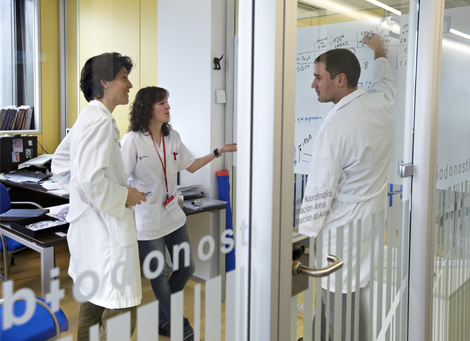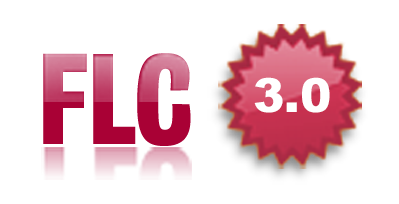Methods and training
![]()
For the correct development of assessments, it is needed to establish appropriate and explicit working methods. Moreover, for the correct interpretation of the products of health technology assessment, as in other disciplines, it is necessary to have basic knowledge of the procedure and methodology common to them.

Therefore, Osteba has published methodological documents and supports, organizes and coordinates a series of training activities in order to convey the spirit and usefulness of the evaluation of the procedures and spread the "evaluative mentality" based on scientific evidence. This will try to avoid the variability of medical practice and diminish unjustified procedures or actions without proven effectiveness.
The courses are held at the request of health centers, professional or scientific societies. The topics are directly related to the activity of health technology assessment: information search, evaluation of scientific evidence, systematic literature review and economic evaluation.
Osteba takes part in different projects in relation with Health Technology Assessment:
Literature searches, information sources, databases, bibliographic reference tools.
- Literature searches protocols in Health Technology Assessment
- Literature bibliographic search protocols adapting them to the different
- Map on shared resources in HTA and Health Services
Critical appraisal of the scientific evidence
- Updating of the Shared Work System for Systematic Reviews of the Evidence and Critical Appraisal (FLC 3.0 Platform).
- External review and validation of methodological instruments for the critical reading and summary of scientific evidence
Early identification and assessment of new, emerging and low added value (disinvestment) technologies.
- Guideline 'Therapeutic medical devices'
- A toolkit for the identification and assessment of new and emerging health technologies
- Prioritization of topics to be evaluated
- Identification of emerging health technologies. Document about the functioning of ‘Sortek’ network
- State-wide network of identification, prioritisation and early assessment of new and emerging health technologies
- Report on the development of the GuNFT Guideline. Guideline for Not Funding existing health Technologies in health care systems
Clinical Practice Guidelines and other practices based on evidence.
- Clinical Practice Guideline about Breastfeeding. Methodological document
- Clinical Practice Guideline about the management of lipids as a cardiovascular risk factor. Methodological document
- Development of recommendations for evidence-based care in Osakidetza. Methodological document
- Description of the elaboration of a clinical practice guideline for asthma in the autonomous community of the Basque Country by means of a mixed method of adaptation-development-actualization.
- Examination of barriers and facilitators for the implementation of clinical practice guidelines: A Delphi study
- Study about the use of Clinical Practice Guidelines in Specialized Care. Examination of barriers and facilitators for its implementation.
- Clinical Practice Guideline without gender bias
- AGREE Next Steps Consortium. Appraisal of Guidelines for Research & Evaluation (AGREE) II Instrument
Assessment methodology
- Economic evaluation guideline in the health sector
- EUnetHTA: HTA Core Model for the production of core HTAs (version 3.0)
- EUnetHTA: HTA Core Model for the production of Rapid Relative Effectiveness Assessments (version 4.2)
- Guideline for the design, evaluation and implementation of health services based on telemedicine
- Guideline for the elaboration and adaptation of rapid health technology assessment reports
- Methodological project: Synthesis of information in support of multi-criteria decision analysis (MCDA) for decision making
- A Roadmap for Systematic Priority Setting and Health Technology Assessment
Dissemination of products
Osteba gives seminars and specific courses in response to formal requests by the health professionals and other organizations within the Basque Country and Osakidetza Basque Health Service hospitals, healthcare settings and areas, research centers, scientific societies and the University of the Basque Country. It also collaborates with other entities responsible for continuing education in the health care sector, both at the regional, national and international levels. The courses are designed adapting to areas of interest of the applicant and are structured mainly around the following areas:
- Literature searches, information sources, databases, bibliographic reference tools.
- Early identification and assessment of new, emerging and low added value (disinvestment) technologies.
- Systematic reviews of the literature
- Analysis of the scientific evidence and critical appraisal.
- Clinical Practice Guidelines, Elaboration and evaluation.
- Economic evaluation in the health care sector.
The educational activities addressing these areas are designed from a theoretical and practical point of view. The contents, teachers, and time allocation of Osteba courses are set according to the specific needs of each application, depending on the aspects of greatest interest to students, prior knowledge, time allocation, etc..

In addition, external courses are organized with teachers from outside our organization, financed with funds from the Cooperation Agreement with the Agency for the Quality Plan of the National Health System of the Ministry of Health, Social Policy and Equity.
Internally, Osteba actively promotes the training of researchers involved in projects that are develop in house, offering workshops and seminars to gain the skills needed for different phases of their work.
Also, residents of Preventive Medicine and Public Health, met part of their specialty training program related to research projects in a training period in Osteba.
Another type of teaching is the learning and training periods of members of other agencies and health organizations. So sometimes professionals come to Osteba from Latin America and from low and middle income countries with developing health technology assessment intiatives.
Below you could find the last courses organized by Osteba:
- Early Awareness and Alert systems (Horizon Scanning) of new and emerging health technologies. Zaragoza, December, 2017.
- Health Technology Assessment and Disinvestment. Gorliz, December, 2017.
Last modified date:




